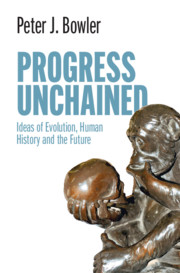Book contents
- Progress Unchained
- Progress Unchained
- Copyright page
- Contents
- Figures
- Preface
- 1 Introduction
- Part I The Ladder of Progress and the End of History
- Part II Towards a World of Unlimited Possibilities
- 7 Darwinian Visions
- 8 The Uniqueness of Humans
- 9 Branching Out
- 10 Towards an Uncertain Future
- 11 Epilogue
- Bibliography
- Index
9 - Branching Out
The Evolution of Civilizations
from Part II - Towards a World of Unlimited Possibilities
Published online by Cambridge University Press: 11 February 2021
- Progress Unchained
- Progress Unchained
- Copyright page
- Contents
- Figures
- Preface
- 1 Introduction
- Part I The Ladder of Progress and the End of History
- Part II Towards a World of Unlimited Possibilities
- 7 Darwinian Visions
- 8 The Uniqueness of Humans
- 9 Branching Out
- 10 Towards an Uncertain Future
- 11 Epilogue
- Bibliography
- Index
Summary
Paralleling the developments in evolutionary biology, cultural anthropologists abandoned the model in which modern Western culture was the goal of development, recognizing the diversity of cultures around the world. Archaeologists realized that different cultures had been shaped by different technological innovations. Thinkers from a range of backgrounds began to see social evolution in Darwinian terms, as a process driven by occasional innovations that were unpredictable on the basis of any general trend. H. G. Wells popularized a view of history on similar foundations, openly acknowledging the parallel with Darwinism. He and others suggested that the linkage of science and invention that had occurred in the West and led to its dominance was an example of such an unanticipated breakthrough. Counterfactual histories imagined worlds in which the key transformations had come out differently. It was now recognized that the ongoing flood of new technologies was transforming society at an accelerating rate, making it hard to predict the course of future progress.
Keywords
- Type
- Chapter
- Information
- Progress UnchainedIdeas of Evolution, Human History and the Future, pp. 222 - 247Publisher: Cambridge University PressPrint publication year: 2021

